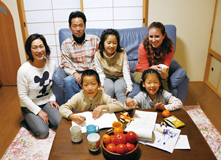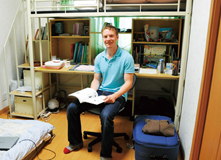The Homestay Program offers learning opportunities for both international students and Japanese families who are seeking to broaden their understanding about different cultures. Living with a Japanese family will provide students with not only an environment to develop their language skills, but opportunities to understand the daily life, values, and customs of the Japanese people, which will inevitably enhance what they have acquired in the classroom. Through homestay experience, students are able to gain an insight into Japanese life by participating in daily routine life.
Success in the program often requires adjusting to household rules (e.g. curfews). Students may feel a certain amount of frustration at being treated as something other than an adult, or they may think that the family is meddling in their lives a little too much. However, students may start enjoying the experience as they understand the Japanese characteristic of "over-care."
By spending time with a host family, students will realize that this unique opportunity of staying with a family is a privilege, and a sense of having home in Japan certainly helps students to overcome some of the difficulties they face in a foreign environment.
Since homestay participation requires interaction with family members and observing daily schedules, students should not engage in any type of part-time work, as it often becomes a source of friction. We feel that strong commitment to the homestay program will result in a congenial homestay situation, and consequently, insure a deeper understanding of Japanese life.



Locations/Commuting:
The locations of host families vary from a short walk to train rides. Since not all the families are located close to the university, students must expect an average of one hour commuting. Commuting involves walking, bicycling, or using public transportation (i.e. buses and trains). Since the Japanese public transportation system is extensively developed and well run, commuting may not be as difficult as it seems. A student discount on a commuting pass is available.
Room Arrangements:
Students are provided with their own furnished bedrooms. The average room size is six tatami mats. Furniture may include a desk, closet, bedding, etc. Household items such as a washing machine, dryer, and TV are shared with the family members.
Meal Arrangements:
Two meals (breakfast and dinner) on weekdays are provided by the host family. Three meals on weekends are included in the homestay arrangement, though students have to buy their own food, should they choose to go out. The sorts of meals served at home may differ from one family to another, but what is most important is to be flexible and try everything at least once. Generally, the host mothers are much more accommodating to students' preferences than normally expected. Students with severe dietary restrictions are strongly encouraged to stay in the dormitory where they can prepare their own meals.
Placements:
In order to avoid the confusion caused by last-minute cancellations, the homestay placements are not finalized until immediately before the beginning of the semester. Therefore, homestay assignments are announced to students during the orientation program after arrival at Kansai Gaidai.
While efforts are made to match students with the most suitable families, it should be understood that there are many factors to be considered to determine the best match for both parties, and therefore not all requests and preferences can be accommodated.
Tips for a successful homestay experience:
Be interested and interact with your family. Your host family will appreciate your sharing interests in Japanese and any other culture. Do not stay in your room by yourself all the time.
Keep your family well informed. Let them know your whereabouts as much as you can. They will be so worried if you do not come home without letting them know.
Be yourself. It is important that you keep your own identity. It is necessary to make adjustments to your host family's life style. However, it is equally important that you are happy with who you are and what you do. Be honest about things you like or do not like so that both parties can make necessary adjustments.
